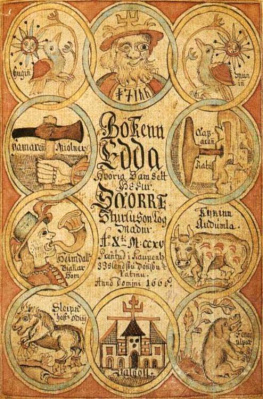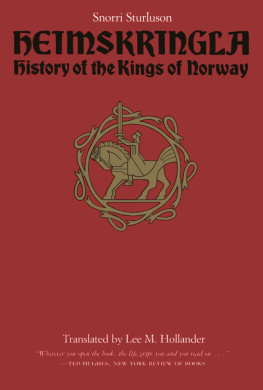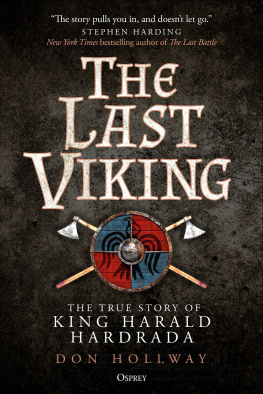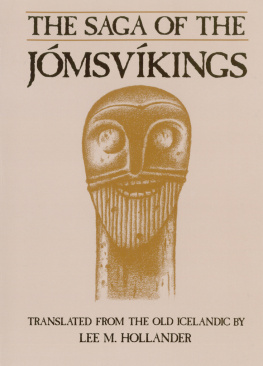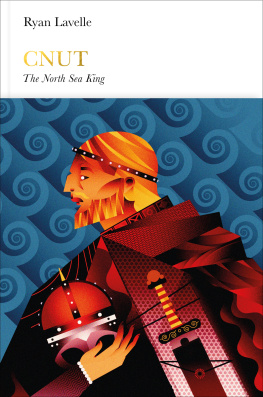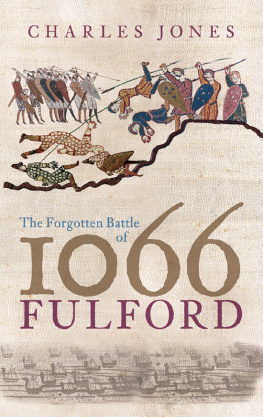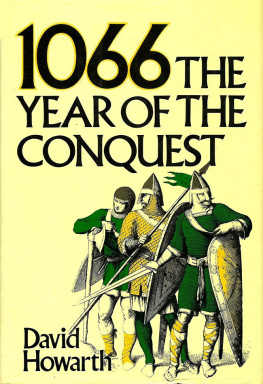
KING HARALDS SAGA
SNORRI STURLUSON was born in 1179 and brought up at Oddi, the home of an aristocratic and cultured family in the south of Iceland (11811201). He then lived as a wealthy landowner, politician and lawyer, and was Lawspeaker of the Althing from 121518 and 122231. He visited Norway twice, 121820 (when he also went to Sweden) and 12379. In 1241 Snorri Sturluson was killed by his enemies. An outstanding personality of medieval Scandinavia and Iceland, he was the author of the Edda, a handbook of Scaldic art, The Olaf Sagas, probably of Egils Saga, and of Heimskringla, a history of the kings of Norway from the half-mythical origins of the dynasty down to the year 1177.
MAGNUS MAGNUSSON is an Icelander who has been resident in Scotland for most of his life. After a career in newspaper journalism in Scotland, he is now a freelance author and broadcaster, best known as the presenter of the BBC quiz programme Mastermind. He is also chairman of the Scottish National Heritage. He studied English and Old Icelandic at Oxford University, and his hobby is translating from Icelandic, both old and new. With Hermann Plsson he has translated three other Saga volumes for Penguin Classics, Njals Saga, Laxdla Saga and The Vinland Sagas.
HERMANN PLSSON studied Icelandic at the University of Iceland and Celtic at University College, Dublin. He was Professor in Icelandic at the University of Edinburgh, where he taught from 1950 to 1988. He was the General Editor of the New Saga Library and the author of many books on the history and literature of medieval Iceland; his more recent publications include Legendary Fiction in Medieval Iceland (with Paul Edwards), Art and Ethics in Hrafnkels Saga and Vikings in Russia (with Paul Edwards). In addition to the three other Saga translations with Magnus Magnusson, Hermann Plsson translated Hrafnkels Saga and (with Paul Edwards) Egils Saga, Orkneyinga Saga, Eyrbyggja Saga and Seven Viking Romances for Penguin Classics. He died in 2002.
SNORRI STURLUSON
King Haralds Saga
Harald Hardradi of Norway
Translated with an Introduction by
MAGNUS MAGNUSSON and HERMANN PLSSON
PENGUIN BOOKS
PENGUIN BOOKS
Published by the Penguin Group
Penguin Books Ltd, 80 Strand, London WC2R 0RL, England
Penguin Group (USA) Inc., 375 Hudson Street, New York, New York 10014, USA
Penguin Books Australia Ltd, 250 Camberwell Road, Camberwell, Victoria 3124, Australia
Penguin Books Canada, Ltd,10 Alcorn Avenue, Toronto, Ontario, Canada M4V 3B2
Penguin Books India (P) Ltd, 11 Community Centre, Panchsheel Park, New Delhi 110 017, India
Penguin Group (NZ), Cnr Airborne and Rosedale Roads, Albany, Auckland 1310, New Zealand
Penguin Books (South Africa) (Pty) Ltd, 24 Sturdee Avenue, Rosebank 2196, South Africa
Penguin Books Ltd, Registered Offices: 80 Strand, London WC2R 0RL, England
www.penguin.com
This translation first published 1966
Reprinted in Penguin Classics 2005
19
Copyright Magnus Magnusson and Hermann Plsson, 1996
All rights reserved
Except in the United States of America, this book is sold subject
to the condition that it shall not, by way of trade or otherwise, be lent,
re-sold, hired out, or otherwise circulated without the publishers
prior consent in any form of binding or cover other than that in
which it is published and without a similar condition including this
condition being imposed on the subsequent purchaser
TO PROFESSOR SIGURUR NORDAL
on his eightieth birthday
14 September 1966
Contents
Introduction
THE year 1066 was a convulsive and fateful year for the destiny of England and western Europe. It was the year that brought together in violent and mortal conflict the three greatest military leaders in Europe of their day Harald of Norway, Harold of England, and William of Normandy; three powerful and ambitious men who had fought their way to authority in their respective countries and who now, in three weeks of terrible bloodshed in the autumn of 1066, were to fight to the death for the greatest prize of all: the throne of England.
In Norway, King Harald Sigurdsson Harald Hardradi, Harald the Ruthless, as later historians were to dub him had fled into exile in 1030 at the age of fifteen when Norway was torn by civil war and his half-brother, King Olaf the Saint, was killed in battle by an army of his own rebellious subjects. After years of plundering in the Mediterranean and Asia Minor as a Viking mercenary in the service of the Byzantine emperors, Harald returned to claim the throne of Norway his brother had lost; and for the next twenty years he ruled Norway by iron discipline and force of arms, and terrorized neighbouring Denmark by constant raiding expeditions. By 1066 he was the most feared warrior in northern Europe, the last of the formidable Viking kings of Scandinavia; and at the age of fifty-one he embarked on the most ambitious enterprise of his relentless career the conquest of England.
In France, Duke William of Normandy William the Bastard as his contemporaries called him, William the Conqueror as he was to prove himself had succeeded to a turbulent province as an illegitimate orphan at the age of seven, in 1035. His boyhood was a nightmare of treachery and danger; and even when he reached manhood he had to survive seven years of incessant warfare and rebellion between 1047 and 1054 before he was able to establish his authority over Normandy beyond serious dispute. By 1066, he was the battle-hardened leader of the most brilliant new secular and ecclesiastical aristocracy in Europe; and in his late thirties he was ready to claim by force what he regarded as a moral inheritance the throne of England.
In England, Earl Harold Godwinsson Harold of Wessex, later to become Harold II of England was born into one of the most thrustful and ambitious family dynasties in Anglo-Saxon England. During the uneasy reign of Edward the Confessor (104266) he survived exile, and then returned to prove his military ability with crushing campaigns against the Welsh, and also his statesmanship by averting civil war between north and south over his brother, Earl Tostig. On 6 January 1066, at the age of forty-four, he was elected and crowned king of England an England whose throne was threatened by rival claims from Scandinavia and Normandy, and weakened by lingering disaffection in the north. For the next nine months, Harold was busy organizing the nations defences against the challenge he knew must come; what he could not know was from where it would come first.
In the event, it came from the north. In September 1066 Harald of Norway sailed across the North Sea with an invasion armada of over 300 ships and came prowling down the coast of Yorkshire. On 20 September, he landed his army of some 9,000 men and destroyed the northern army that barred his way to York at Fulford. But five days later, on Monday, 25 September, Harold of England arrived with another army after a forced march of 190 miles from London, and fell upon the surprised Norwegian invaders at Stamford Bridge. The slaughter that ensued was remembered with awe for generations; by nightfall, the Norwegian army was all but wiped out, and Harald of Norway lay dead. His death marked the end, to all intents and purposes, of the Viking era that so coloured the politics of medieval Europe, the end of 350 years, of Scandinavian harassment of England.
But when Harald of Norway died, his victor, Harold of England, himself had only nineteen more days to live. Three days after the Battle of Stamford Bridge, William of Normandy, descendant of the Viking invaders who had settled in France 150 years earlier, landed on the south coast of England with an army of 7,000 men; and Harold of England set off on a forced march once again, to fight the last battle to be fought on English soil against an invasion army, on the Downs above Hastings on 14 October 1066.
Next page


